British Expedition Against Emperor Tewodros II of Abyssinia
2 Jan, 1868 - 13 May, 1868
Gen. Napier's British Expedition against Tewodros II of Abyssinia landed at Zula (Eritrea) for provoking Queen Victoria. Kassa Mercha became Emperor Yohannes IV upon Tewodros' demise by aiding the expedition.
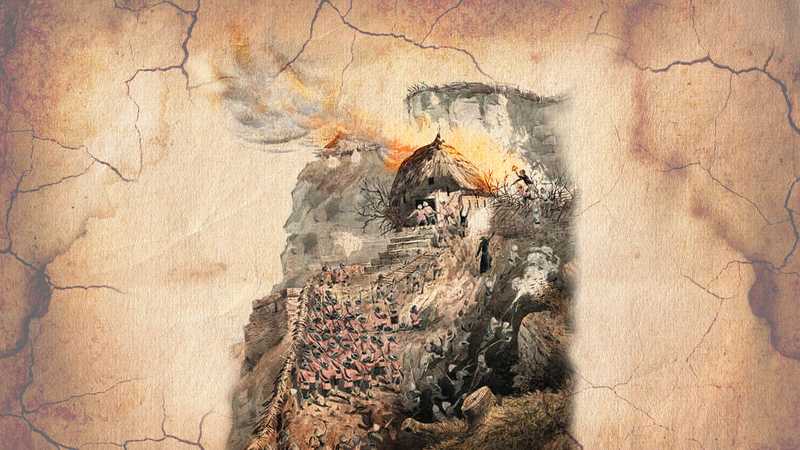 The Battle of Magdala, the British against Emperor Tewodros of Abyssinia
The Battle of Magdala, the British against Emperor Tewodros of Abyssinia
Kassa Hailu of Dembiya (Lake Tana area) rose to power during the “Age of Princes” (ዘመነ መሳፍንት). He became the Emperor of Abyssinia in February 1855. During his reign, he built his fortress at Magdala in southern Showa.
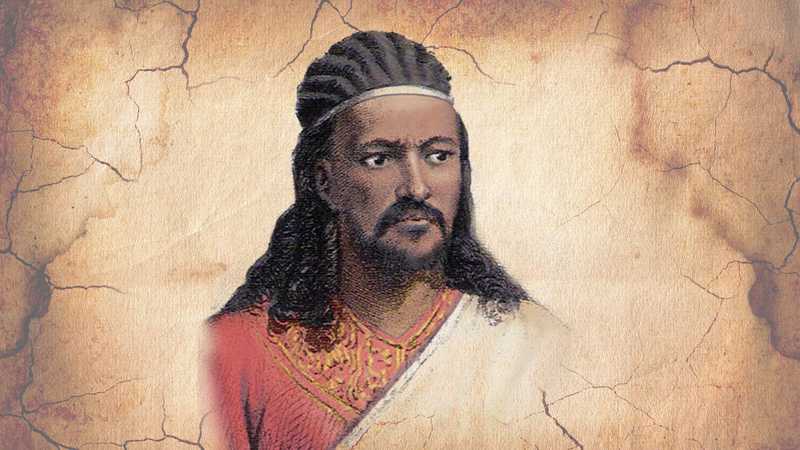 Kassa Hailu, later Emperor Tewodros II of Abyssinia
Kassa Hailu, later Emperor Tewodros II of Abyssinia
During this time, Muslim Turks and Egyptians were constantly invading Abyssinia from the Red Sea and Sudan while Muslim Oromo tribes were expanding in the southern part of the empire.
Tewodros Seeks Queen Victoria’s Assistance
Believing as a Christian monarch their interests would align, he approached the British emissary in Abyssinia at the time, Captain Charles Duncan Cameron, to deliver a letter personally to Queen Victoria of the British Empire. His letter asked for assistance from the queen; he asked for weapons and skilled experts who could train his subjects in building weapons and other technical needs of the empire.
Cameron set out for Britain but only sent the letter from the Red Sea coast and returned to Abyssinia after a short visit to Sudan, which was in constant conflict with Tewodros. Tewodros was enraged. After waiting for a response for two years, he imprisoned Cameron along with other Europeans he believed had described him as barbaric in Europe.
Provoking a Response
This was mainly to get the attention of Queen Victoria. His letter was ignored by the British because they had planned to cooperate with the Ottoman Empire, Egypt and Sudan irrespective of their religion; they needed safe passage for their fleet through the Red Sea.
They also wanted to maintain access to the resources from these territories that they had come to depend on for resources such as cotton from Egypt and Sudan. It is to be remembered here that they had lost their colonies in the Americas that provided these imports.
Breach of Diplomatic Immunity
The British responded to this by sending a letter from the queen with another emissary, Hormuzd Rassam. But Hormuzd Rassam was also imprisoned by the emperor because he did not come with what he had asked for.
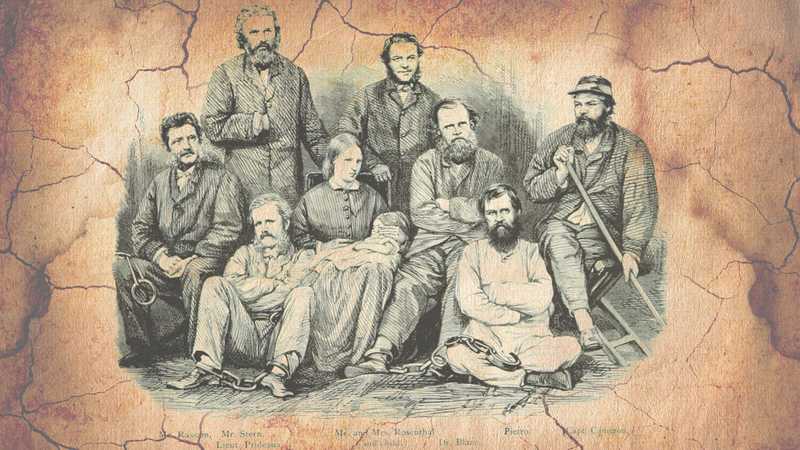 European prisoners of Emperor Tewodros of Abyssinia; Hormuzd Rassam is first from left, Captain Charles Cameron last
European prisoners of Emperor Tewodros of Abyssinia; Hormuzd Rassam is first from left, Captain Charles Cameron last
This breach of diplomatic immunity was the last straw for the British. The queen ordered to send a British Expeditionary Force to Abyssinia commanded by Lieutenant General Robert Napier, who commanded the British Bombay Army which was a British colony at the time.
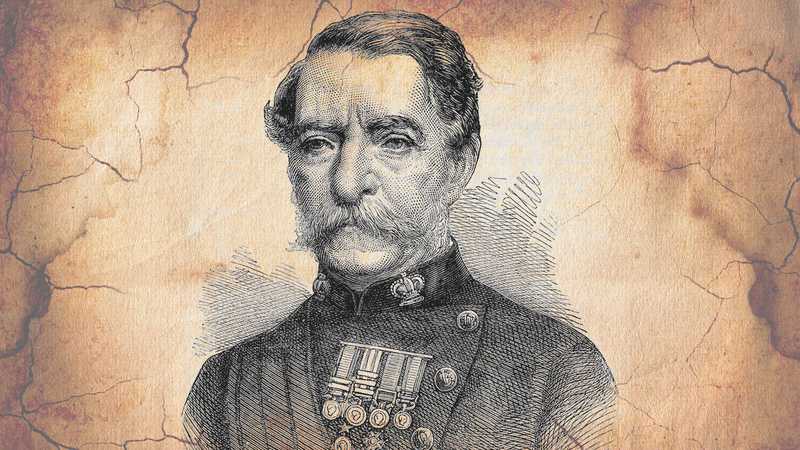 Lieutenant General Robert Napier, the Commander-in-Chief of the British Bombay Army
Lieutenant General Robert Napier, the Commander-in-Chief of the British Bombay Army
The British Send an Army
The army consisted of 30,000 personnel arriving in 241 ships. The advance elements of the expedition landed at Annesley Bay or the Gulf of Zula (a.k.a. Bay of Arafali) on the 21st of October 1867. General Napier arrived on January 2, 1868.
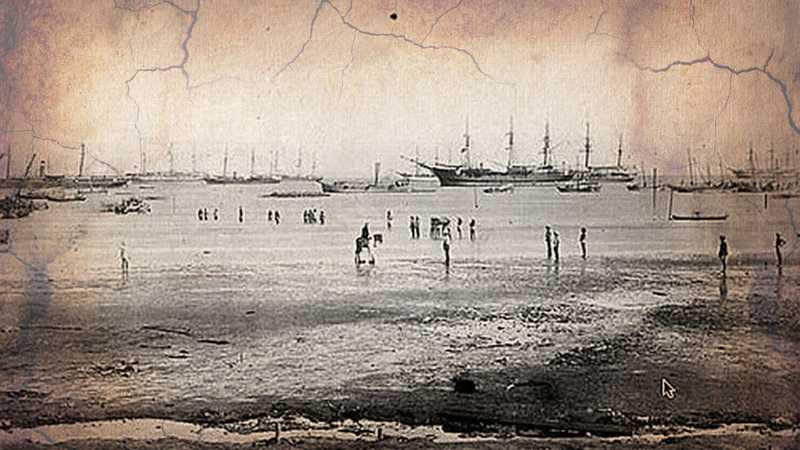 British expeditionary force landing at Annesley Bay or Gulf of Zula
British expeditionary force landing at Annesley Bay or Gulf of Zula
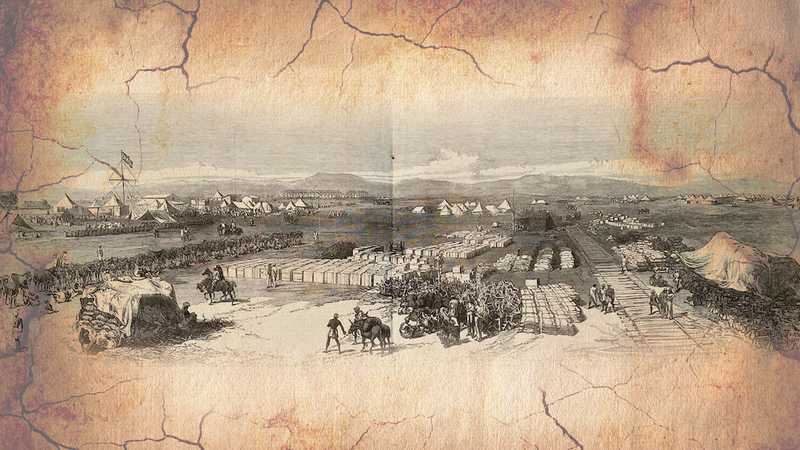 British expeditionary force camp at Zula; campaign against Tewodros II of Abyssinia
British expeditionary force camp at Zula; campaign against Tewodros II of Abyssinia
Rebelling Warlords Help the British
The remoteness of Abyssinia dictated that the British army seek help from local chiefs, many of whom had gotten disillusioned with the emperor. Many had rebelled against him. One powerful figure of these was Kassa Mercha of Tigray who controlled Tigray, parts of Semien and central highlands of current-day Eritrea.
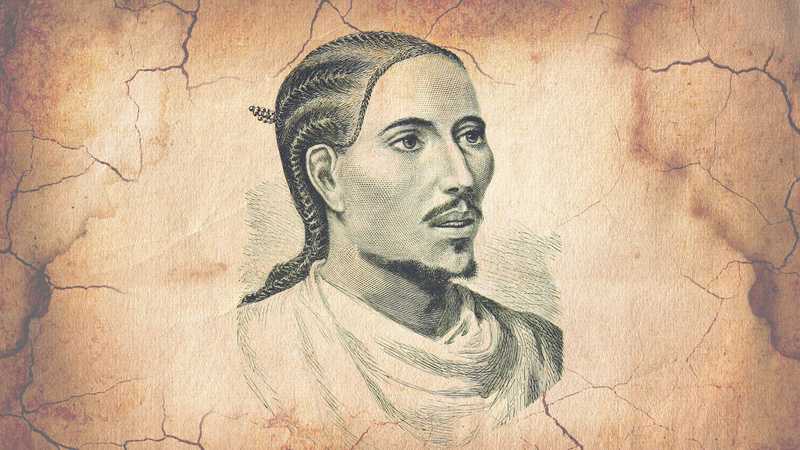 Dejazmach Kassa Mercha a.k.a Aba Bezbz, future Emperor Yohannes IV of Abyssinia
Dejazmach Kassa Mercha a.k.a Aba Bezbz, future Emperor Yohannes IV of Abyssinia
Dejazmach Kassa Mercha of Tigray (Aba Bezbz), who had rebelled against Emperor Tewodros and successfully waged several battles against the emperor’s allies, had secured all of Tigray and the central highlands of current-day Eritrea.
British Promise for Their Safe Passage
Dejazmach Kassa agreed with the British to provide them with a safe passage through the region under his control. He allowed them to acquire supplies from the local markets on their way to Magdala, Showa.
In return, upon successful completion of their campaign, the British would leave him with a significant amount of ammunition which would help him with his ambition of becoming emperor. He would eventually become Yohannes IV of Abyssinia.
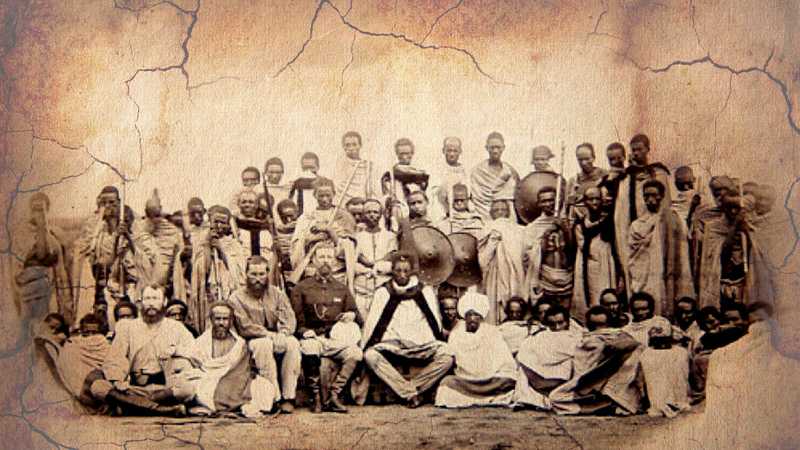 Dejazmach Kassa Mercha of Tigray, future Emperor Yohannes IV, rendezvous with General Napier’s delegation; in the front sitting from left to right: Captain Tristram Speedy, Liqe Mekwas Alema, the cousin of Kassa, Werner Munzinger, the Egyptian governor of Massawa, Major Grant, Kassa Mercha, Priest Gebremichael
Dejazmach Kassa Mercha of Tigray, future Emperor Yohannes IV, rendezvous with General Napier’s delegation; in the front sitting from left to right: Captain Tristram Speedy, Liqe Mekwas Alema, the cousin of Kassa, Werner Munzinger, the Egyptian governor of Massawa, Major Grant, Kassa Mercha, Priest Gebremichael
As the British army advanced, Tewodros moved his army from Debre Tabor to the fortress of Magdala. His army consisted of 30,000 men.
The Battle of Aroge
On the 10th of April, the armies clashed at the plateau of Aroge where Tewodros sent 6,000 men to attack the British positions. Many of his soldiers were killed. The Abyssinians fell back.
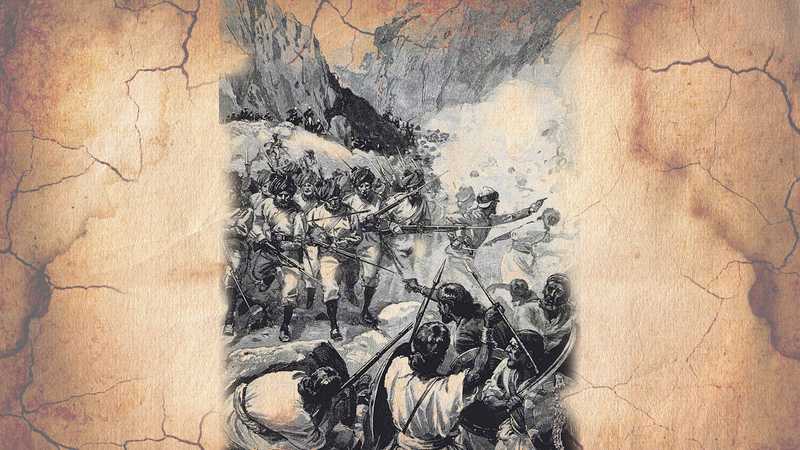 British Punjab Pioneers attacking at the Battle of Magdala
British Punjab Pioneers attacking at the Battle of Magdala
At this point, Tewodros was desperate and enraged. He could not escape to the south as the Oromo tribes in the south were already blocking him, practically making the situation a siege. In a rage, he killed many of his prisoners from the south. He asked one of the European prisoners to reconcile him with Napier. Many of his soldiers surrendered but he could not accept Napier’s demand for unconditional surrender.
The Fall of Magdala - Death of Tewodros
Tewodros shot himself.
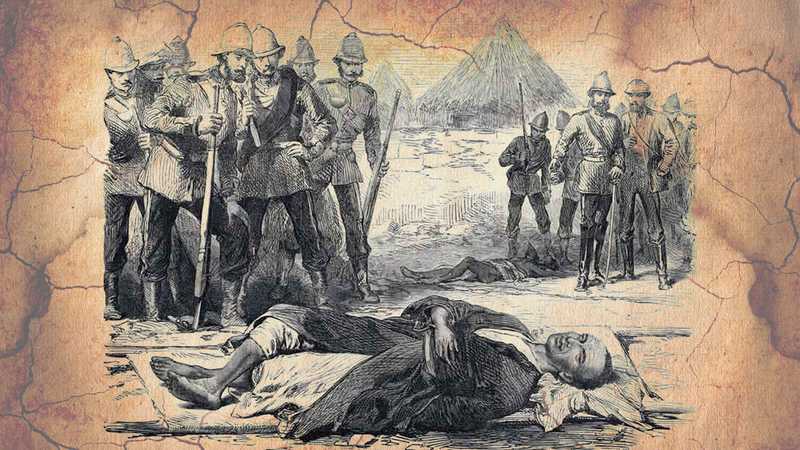 The death of Emperor Tewodros II of Abyssinia
The death of Emperor Tewodros II of Abyssinia
The War Loot
The British captured Magdala. They took many of Tewodros’s royal belongings and took them to Britain. They are still in Britain.
They also took his young son, Prince Alemayehu, with them; his mother was traveling with him although she died on the way before leaving Abyssinia. Although he died young, he grew up in Britain and was presented to Queen Victoria who took a close interest in him and his upbringing and education.
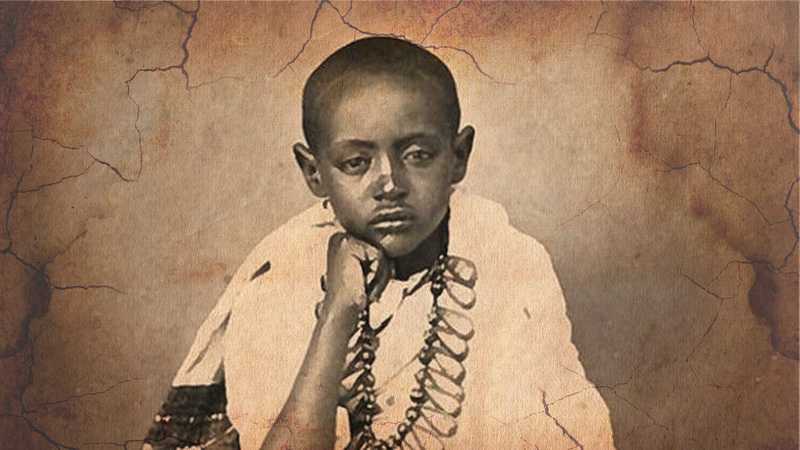 Prince Alemayehu, son of Tewodros II of Abyssinia
Prince Alemayehu, son of Tewodros II of Abyssinia
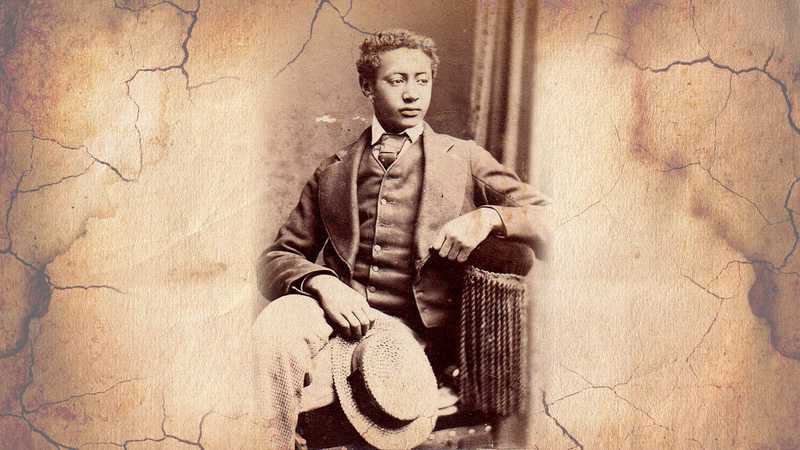 Prince Alemayehu, son of Tewodros II of Abyssinia in Britain
Prince Alemayehu, son of Tewodros II of Abyssinia in Britain
